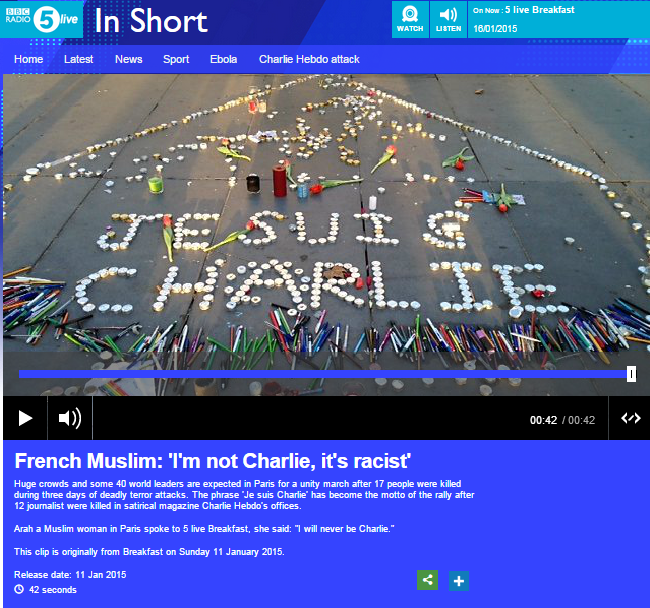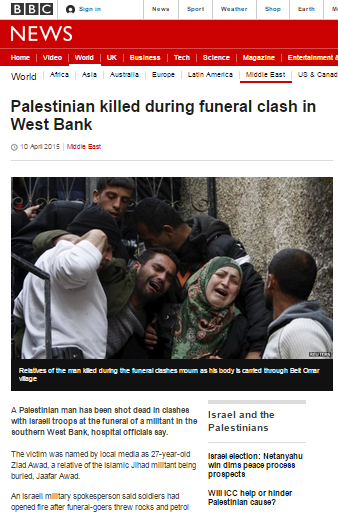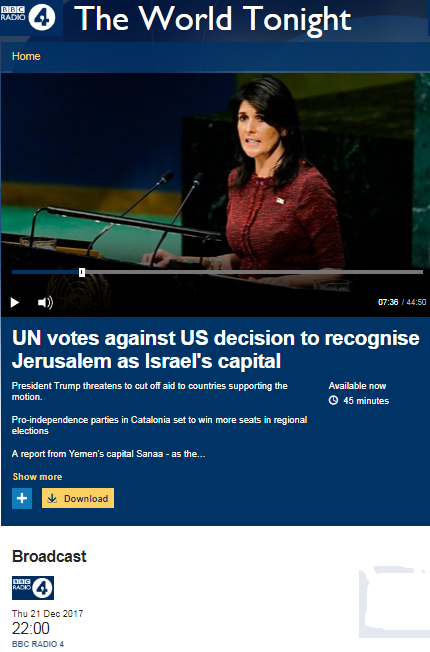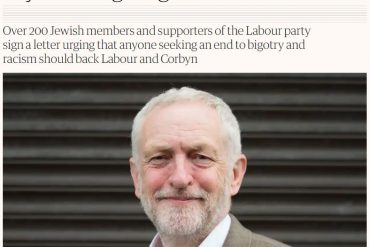As we noted here the other day, BBC reporting on the Paris terror attacks has been notable for its tendency to avoid of any meaningful discussion of the actual issue of Islamist extremism and instead, audience attentions have been deflected towards a variety of other themes.
Some BBC content amplified the erroneous notion that Charlie Hebdo is a racist magazine. For example, this clip – broadcast on Radio 5 live’s Breakfast programme on January 11th – was also promoted separately on social media.
In the January 9th edition of the BBC World Service’s ‘The World This Week’ (available as a podcast here) presenter Emily Buchanan was joined by French journalists Agnes Poirier and Nabila Ramdani. Buchanan’s introduction to the item indicates that she was well aware of the fact that just hours before her broadcast, four people had been killed in a terror attack on a Jewish target.
“The funeral bells of Notre Dame Cathedral tolled in the rain for the twelve people shot dead in and near the offices of the French satirical magazine Charlie Hebdo; gunned down on Wednesday by men shouting Islamist slogans. The attack was, they shouted, revenge for the magazine’s insults to the Prophet Mohammed and Islam. The killings sent shock waves around France and beyond. [….] France went on maximum alert. The security forces identified the suspects as two brothers of Algerian descent who had a long history of links to extremist groups. After a two-day man hunt police eventually ran them to ground at a print works outside Paris. The brothers died in a hail of bullets. A hostage they’d taken survived. Meanwhile, in an apparently linked attack, another gunman who had already killed a policewoman took more hostages inside a kosher supermarket. In a dramatic simultaneous assault, he too died but so did at least four of his hostages, though a number survived.”
Nevertheless, Buchanan’s first question/statement to Ramdani was:
“And Nabila Ramdani; the impact on the Muslim community must be profound.”
There was no discussion in the programme of the impact on the Jewish community which had lost four of its members just hours earlier. Buchanan went on to provide Ramdani with an opening for promotion of the notion of Charlie Hebdo as a ‘racist’ publication.
Buchanan: “But Nabila, I mean, amongst many in the Muslim community those cartoons were seen as very offensive weren’t they? And I mean some people may even have said that they were racist.”
Ramdani used the cue to tell listeners that:
“It had faced criticisms in the past for dressing up racism as satire. There was a fair amount of racism lurking behind the magazine.”
In response to Agnes Poirier’s attempt to refute that labelling, Ramdani went on to make the baseless claim that:
“Islam was particularly what Charlie Hebdo had it in for…”
Obviously the focus on this misleading theme contributed nothing to informed audience understanding of the magazine itself or the real motives behind the terror attack.
Another theme heavily promoted in BBC content was that of the terror attacks being attributable to radicalization prompted by socio-economic factors and alienation. One example of that came in a programme which perhaps flies under the radar of many readers – BBC Radio Scotland’s ‘Sunday Morning’. The January 11th edition of that show – presented by Ricky Ross – included discussion of the Paris terror attacks (from 01:01:10 here) with Nabila Ramdani once again and also with Alison Phipps – Professor of Languages and Intercultural Studies at the University of Glasgow and a member of the Kairos Document supporting Iona Community.
That item is too long to transcribe here in full but notably its focus was on the attack against Charlie Hebdo, with no specific mention of the targeting of the Jewish supermarket two days before this broadcast and hence Nabila Ramdani was able to tell listeners that “the element of surprise came because Paris has been remarkably free of terrorist incidents over the past, you know, so many decades…”.
The context of antisemitic attacks and incitement in Paris and elsewhere in France was hence concealed from listeners. Audiences did however get a hefty dose of misguided PC messaging from Alison Phipps, who equated the Paris attacks with the 1996 Dunblane attack in Scotland and the Breivik attacks in Norway.
“I think the problem here is the problem of violence and the problem of violence produced out of despair and anger and fear. I think it’s easy to move into debates about a clash of civilisations or religions but actually to me that feels intellectually a bit lazy really….”
“We see violence occurring in the context of Europe and this being not something that’s coming particularly out of any religious motivation or civilization motivation but people who are despairing and resorting to violence and they’re committing crimes as a result.”
“I think …that when people feel threatened and they’re despairing, when people feel as though they’re assaulted and attacked, they tend to resort to more violent means…”
Another theme promoted in this programme and in other BBC content was spurious linkage between the Paris attacks and events elsewhere in the world with Ricky Ross talking about “people who maybe have been angered by the events of the war in Iraq, perhaps the invasion of Afghanistan and also perhaps of drone strikes and so on….”
In an article titled “France divided despite uplifting rallies” which appeared on the BBC News website on January 11th, Hugh Schofield chose to highlight the following sentiments attributed to anonymous members of the French Muslim community, but failed to provide readers with any factual answers to the questions posed.
“Over and again they express their anger at what they see as double standards:
Why so much fuss over 17 dead when thousands have died in Gaza and Syria?
Why is it all right for Charlie Hebdo to mock Islam when the controversial comic Dieudonne M’bala M’bala is prosecuted for mocking Jews? Why is one defined as “inciting hatred” and not the other?”
In a report from January 10th titled “Young French Muslims fear attack after Paris shootings” produced for Newsbeat – which caters for younger audiences – Duncan Crawford quoted one of his interviewees as saying:
“The problem is 12 people are dead. All the media talk about it. But in Iraq, in Syria, and in Palestine, every day thousands of people are dead, and no one talks about it. That’s the real problem.”
No attempt was made to provide the BBC’s younger audiences with information which would enable them to put that statement into its correct context.
When major events such as last week’s terror attacks in Paris take place, it is obviously the task of the media to help the general public determine the facts of the event and its context as soon as possible so that they can reach informed opinions. The BBC is of course obligated to precisely such priorities by its public purposes and yet its commitment to building “a global understanding of international issues” did not prevent avoidance of any serious reporting on the real issues behind these attacks.
The concurrent smoke and mirrors promotion of themes such as ‘racist’ cartoons, poverty, despair, alienation and disaffection do not contribute to audience understanding of the underlying issues faced by European society in general – and members of the Muslim communities battling radicalisation in particular – any more than the promotion of the theme of ‘Gaza’ helps them understand why a Jewish supermarket was the target of one of these terror attacks.





